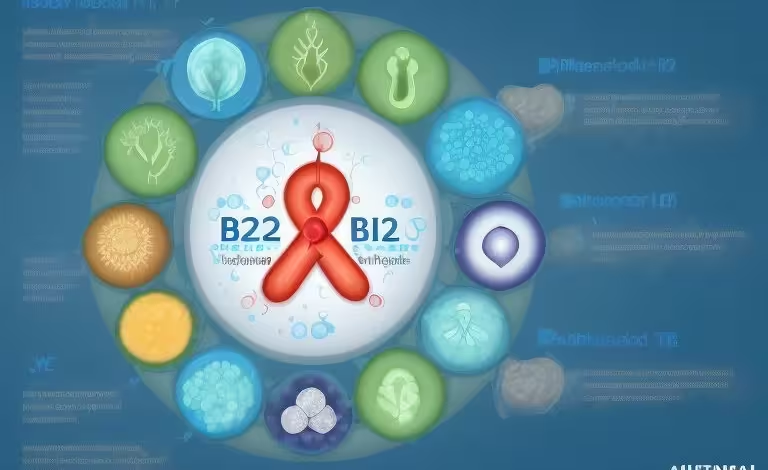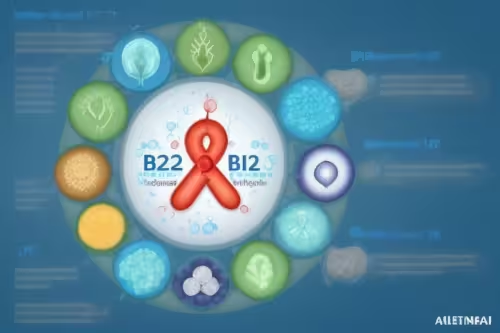High Vitamin B12 Levels: What Do They Mean and Should You Be Concerned?

High Vitamin B12 Levels: What Do They Mean and Should You Be Concerned?
Vitamin B12 is a crucial nutrient that plays a vital role in keeping your nerves healthy and supporting the production of DNA and red blood cells. Most people associate vitamin B12 with deficiencies, but what happens when your B12 levels are too high? Is having high vitamin B12 a cause for concern, or does it indicate something more serious? In this article, we’ll dive into what high vitamin B12 levels mean, the potential causes, and what you should do if your levels are elevated.

What is Vitamin B12?
Vitamin B12, also known as cobalamin, is a water-soluble vitamin that is essential for various bodily functions. It’s crucial for the production of red blood cells, DNA synthesis, and the proper functioning of your nervous system. Unlike some other vitamins, B12 is stored in significant amounts in the liver, which means it can take years for a deficiency to develop if your intake is low.
Functions of Vitamin B12:
- Red Blood Cell Formation: Helps prevent anemia by aiding in the production of healthy red blood cells.
- DNA Synthesis: Essential for the replication and maintenance of genetic material.
- Nerve Health: Supports the myelin sheath that protects nerves, ensuring proper nerve function.
While vitamin B12 is essential, more isn’t always better. Elevated levels of B12 can sometimes signal underlying health issues that require attention.
What is Considered High Vitamin B12?
Vitamin B12 levels are typically measured through a blood test, with normal levels generally ranging between 190 to 950 picograms per milliliter (pg/mL). High vitamin B12 levels are generally considered to be anything above the upper limit of this range. However, what’s considered “high” can vary depending on the lab and the specific circumstances of the individual being tested.
Symptoms of High Vitamin B12 Levels:
Unlike a deficiency, high levels of vitamin B12 usually don’t cause specific symptoms. In most cases, elevated B12 levels are discovered incidentally through routine blood tests rather than because of any noticeable symptoms. However, it’s crucial to understand that elevated B12 levels can be an indicator of other health issues, and addressing the underlying cause is essential.
Causes of High Vitamin B12 Levels
High vitamin B12 levels can result from a variety of factors, ranging from supplementation to more serious health conditions. Understanding the potential causes can help you determine whether further investigation is needed.
1. Excessive Supplementation
One of the most straightforward reasons for elevated B12 levels is excessive intake of vitamin B12 supplements or fortified foods. Since B12 is water-soluble, it’s generally considered safe, and excess amounts are usually excreted through urine. However, consistently high intake of B12 through supplements can lead to elevated blood levels.
2. Liver Disease
The liver plays a central role in storing and regulating vitamin B12 levels in the body. Conditions that affect the liver, such as hepatitis, cirrhosis, or liver cancer, can cause B12 levels to rise. This happens because the liver releases stored B12 into the bloodstream, leading to higher than normal levels.
3. Kidney Disease
The kidneys are responsible for filtering waste products, including excess vitamins, from the blood. In cases of kidney disease or failure, the kidneys may not be able to filter B12 effectively, leading to an accumulation of the vitamin in the blood.
4. Blood Disorders
Certain blood disorders, such as polycythemia vera or leukemia, can result in elevated B12 levels. These conditions cause an overproduction of blood cells, which can increase the amount of B12 circulating in the blood.
5. Cancer
Some types of cancer, particularly those affecting the liver or blood, can lead to high B12 levels. Tumors may produce B12 or cause the release of stored B12 from the liver, resulting in elevated levels in the bloodstream.
6. Infection or Inflammation
Chronic infections or inflammatory conditions can also lead to elevated B12 levels. In such cases, the body’s response to infection or inflammation may cause an increase in B12 levels as a secondary effect.
7. Genetic Factors
In rare cases, certain genetic conditions can cause high levels of B12. These conditions affect how B12 is processed and stored in the body, leading to an accumulation in the blood.
Should You Be Concerned About High Vitamin B12 Levels?
While high vitamin B12 levels don’t typically cause symptoms, they can be a marker of underlying health issues that need to be addressed. It’s important not to ignore elevated B12 levels, especially if they are significantly above the normal range.
Potential Risks of High Vitamin B12 Levels:
- Cancer: Elevated B12 levels have been associated with certain types of cancer. While B12 itself isn’t likely to cause cancer, high levels may be a marker of the disease.
- Liver Disease: High B12 can indicate liver dysfunction, which can have serious health consequences if not managed properly.
- Kidney Disease: Elevated levels might suggest that the kidneys are not filtering blood properly, which could lead to other complications.
What to Do If Your Vitamin B12 Levels Are High
If you’ve been diagnosed with high vitamin B12 levels, it’s important to work with your healthcare provider to determine the underlying cause. Here are some steps you can take:
1. Review Your Supplements
If you’re taking vitamin B12 supplements, review your dosage with your healthcare provider. In many cases, simply reducing or stopping the supplement can bring your B12 levels back to normal.
2. Get Further Testing
Additional tests may be needed to identify the underlying cause of high B12 levels. These could include liver function tests, kidney function tests, or imaging studies to check for tumors or other abnormalities.
3. Monitor Your Health
Regular monitoring of your vitamin B12 levels can help ensure that any underlying issues are detected early. If you have a condition that causes elevated B12 levels, regular check-ups with your healthcare provider are essential.
4. Address Underlying Conditions
If high B12 levels are due to an underlying health condition, such as liver disease or cancer, treating the condition can help normalize your B12 levels. Work closely with your healthcare team to manage any underlying health issues effectively.
Preventing High Vitamin B12 Levels
Prevention of high vitamin B12 levels largely depends on managing the factors that can cause them. Here are some tips to help keep your B12 levels in a healthy range:
1. Manage Supplement Intake
If you’re taking B12 supplements, make sure you’re not exceeding the recommended dose unless advised by your healthcare provider. Remember that more isn’t always better when it comes to vitamins.
2. Maintain a Balanced Diet
Eating a balanced diet that includes natural sources of B12, such as meat, fish, dairy, and eggs, can help you maintain optimal B12 levels without over-relying on supplements.
3. Regular Health Check-Ups
Regular check-ups with your healthcare provider can help detect any health conditions that might lead to elevated B12 levels. Early detection and management of these conditions are key to preventing complications.
4. Monitor Chronic Conditions
If you have a chronic condition like liver or kidney disease, working with your healthcare provider to manage it effectively can help prevent elevated B12 levels.
While vitamin B12 is essential for good health, having too much of it can be a sign of underlying health issues that require attention. Elevated B12 levels are often discovered incidentally and may not cause symptoms on their own, but they can indicate serious conditions such as liver disease, kidney disease, or cancer.
If your B12 levels are high, it’s important to work with your healthcare provider to determine the cause and take appropriate action. Whether it’s adjusting your supplement intake, undergoing further testing, or managing a chronic condition, addressing the underlying issue is crucial for maintaining your overall health.
Remember, your health is a dynamic balance, and understanding the role of nutrients like B12 can help you navigate your wellness journey with confidence.



